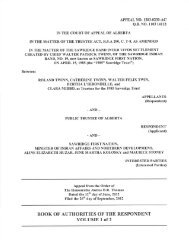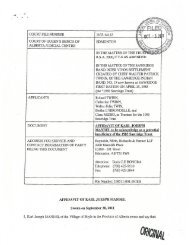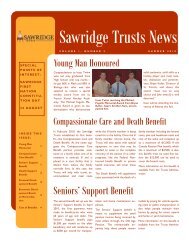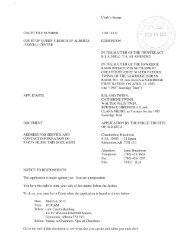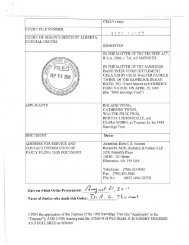31420-12-1 SAWRIDGE, Indian vs. ROLAND, Twinn et al
31420-12-1 SAWRIDGE, Indian vs. ROLAND, Twinn et al
31420-12-1 SAWRIDGE, Indian vs. ROLAND, Twinn et al
You also want an ePaper? Increase the reach of your titles
YUMPU automatically turns print PDFs into web optimized ePapers that Google loves.
F24<br />
1 noevidence before you. I’m not sure if you’re prepared to take judici<strong>al</strong> notice that the<br />
2 Public Trustee’s Office is not impecunious, but it doesn’t matter because there is no<br />
3 evidence before you of any impecuniosity. And when we look at Tab 13 of our brief,<br />
4 there is an excerpt from Orkin on The Law of Costs. And if we look at the third<br />
5 paragraph on that case, it says: The test is strictly applied and an applicant must me<strong>et</strong> a<br />
6<br />
7<br />
high standard of proof in order to demonstrate impecuniosity.<br />
8 And then going up in the last portion of the second paragraph, it says: In practice, this<br />
9 would require some examination into the claimant’s ass<strong>et</strong>s and expenses as well as the<br />
10 possibility of obtaining funding elsewhere. This requirement was not m<strong>et</strong> in the case<br />
11 where <strong>al</strong>though the claimant’s expenses exceeded his modest income, he took an annu<strong>al</strong><br />
<strong>12</strong> vacation, drove a rented car, and had not applied for leg<strong>al</strong> aid or sought funding from a<br />
13<br />
14<br />
community based group.<br />
15 If that recitation is in fact the test, clearly there’s nothing before you that would satisfy<br />
16<br />
17<br />
even the first aspect of the test.<br />
18 We have said very clearly that this case will be argued before you regardless. So it’s not<br />
19 the case that we have with Little Sisters or with Okanagan or Caron, any of those cases<br />
20 where they said, If you don’t give us costs, we cannot move forward and we will not be<br />
21 able to argue. This case will be argued in front of you. And <strong>al</strong>l the evidence and <strong>al</strong>l the<br />
22 arguments will be presented. We would suggest that it <strong>al</strong>so doesn’t transcend the<br />
23 individu<strong>al</strong> interests, that it de<strong>al</strong>s with a sm<strong>al</strong>l group. It doesn’t affect a larger group. But<br />
24<br />
25<br />
in any event, for sure we would say that it doesn’t me<strong>et</strong> the first two aspects of the test.<br />
26 The other issue that I think is important to note, if we look at the Little Sisters case,<br />
27 which is at Tab 11 of our brief, and this may be som<strong>et</strong>hing we need to de<strong>al</strong> with later, but<br />
28 on page 2, in looking at the summary and if we look at the last portion of the second<br />
29 paragraph, so where it says, Per Bastarache, LeBel, and Deschamps. The last paragraph,<br />
30<br />
31<br />
it says:<br />
32 If advance costs are granted, the litigant must relinquish some<br />
33 manner of control over how the litigation proceeds. An advance<br />
34 costs award is meant to provide a basic level of assistance<br />
35 necessary for the case to proceed. Accordingly, courts should s<strong>et</strong><br />
36 limits on the rates and hours of leg<strong>al</strong> work chargeable and cap<br />
37<br />
38<br />
advance costs award at an appropriate glob<strong>al</strong> amount.<br />
39 So Ithink that in the event that you find that it has to be done, then we need to move to<br />
40<br />
41<br />
that next level in terms of s<strong>et</strong>ting those limits.



